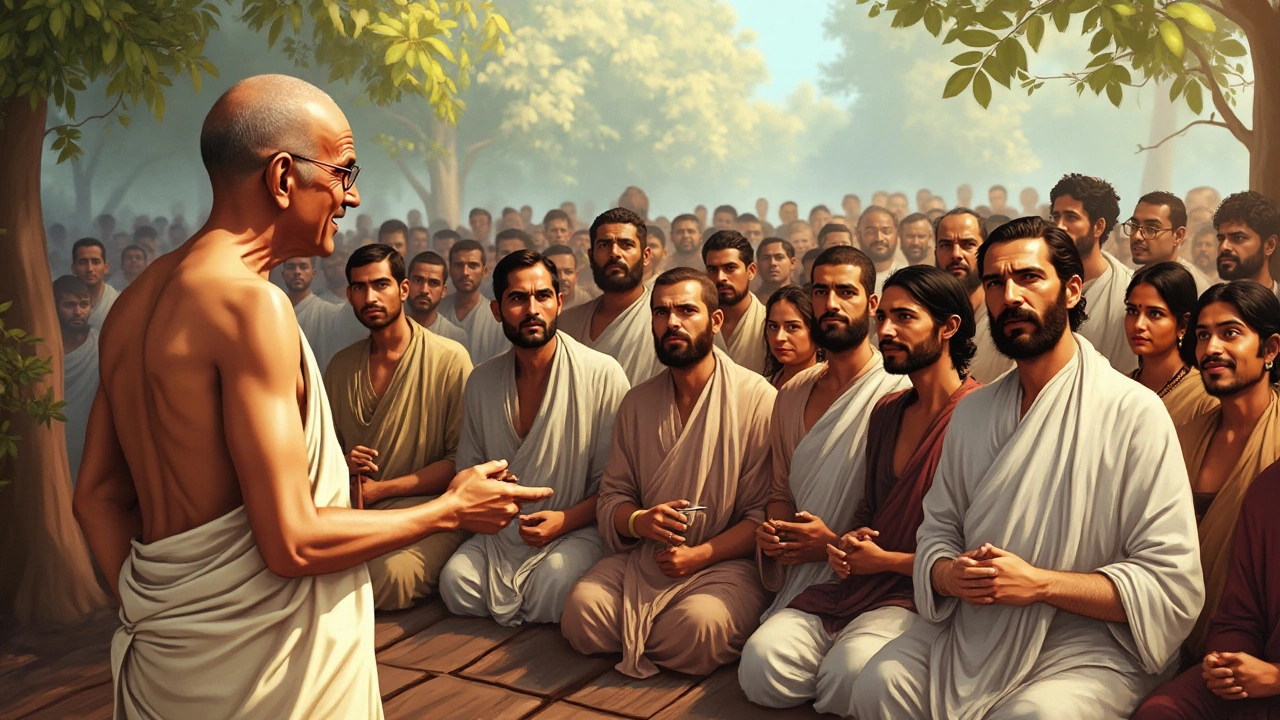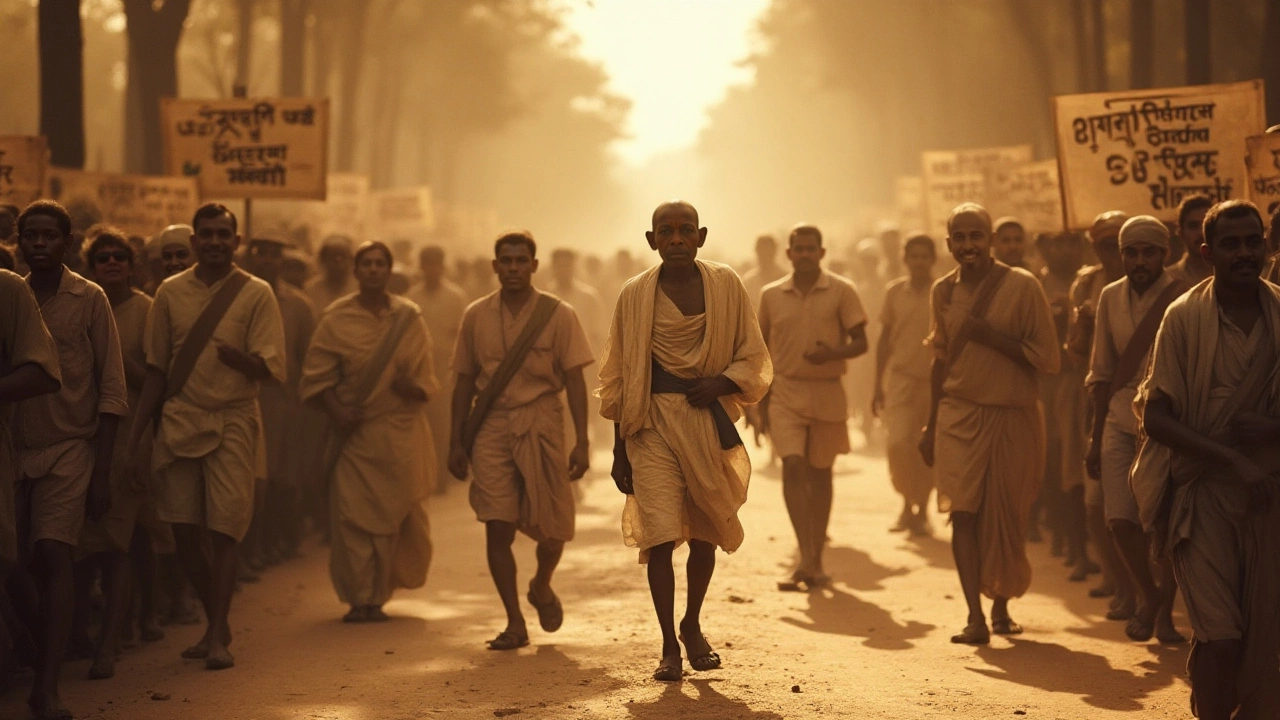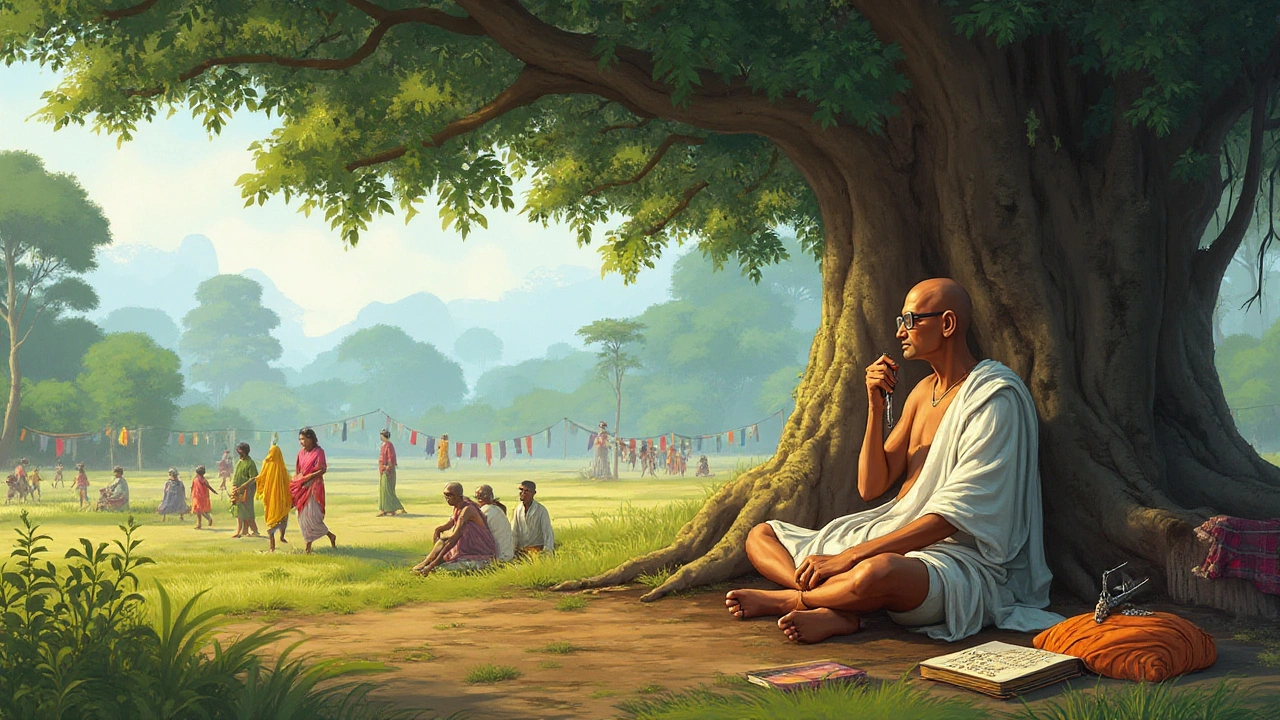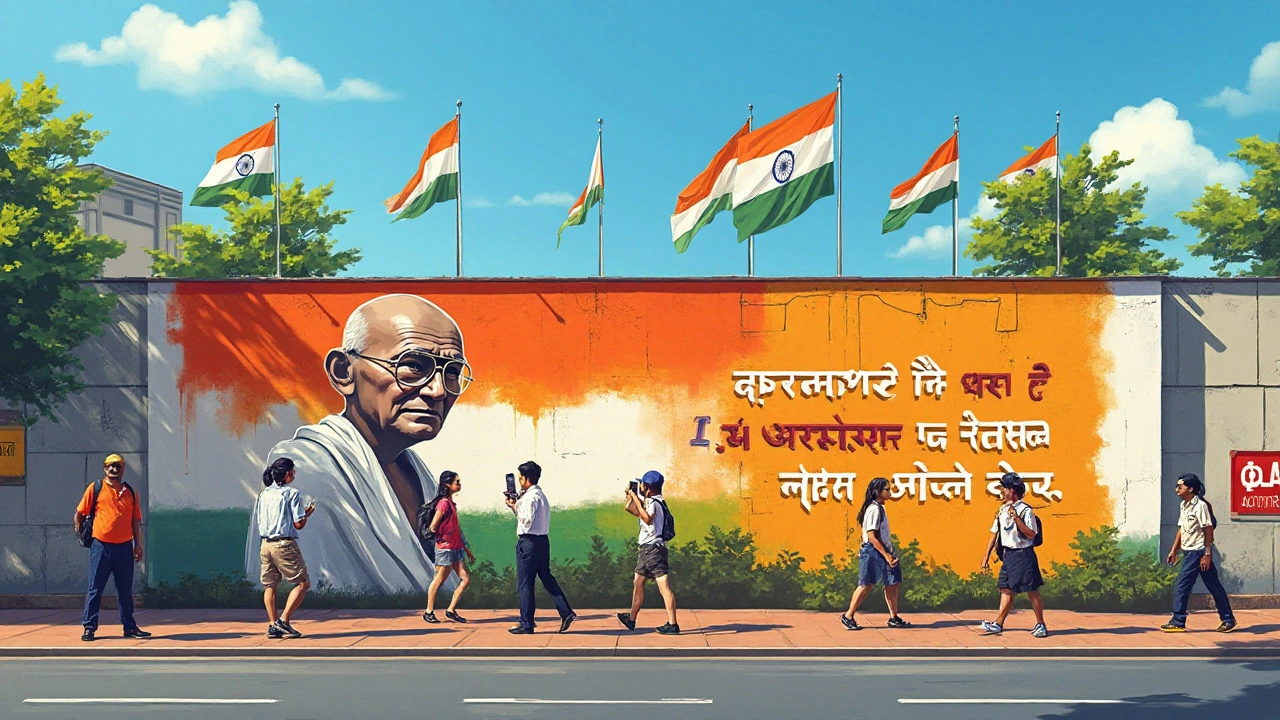Gandhi's Impactful Slogans That Changed India
 Jan, 19 2025
Jan, 19 2025
Mahatma Gandhi, known as the Father of the Nation in India, believed in the power of words as a tool for social change. His slogans weren't just mere phrases; they were a call to action and a source of inspiration for millions. Each slogan reflected his commitment to truth, non-violence, and justice, which became the cornerstones of the Indian freedom struggle.
Gandhi's talent for encapsulating profound ideas into simple yet powerful slogans helped ignite a revolutionary spirit. From 'Do or Die' to 'Quit India', these words drove citizens to act with courage and unity against colonial oppression. Today, his slogans serve as a timeless reminder of the power of peaceful resistance and remain relevant in various advocacy movements across the globe.
- Gandhi's Approach to Inspiration
- Key Slogans and Their Contexts
- The Power of Words in India's Freedom Struggle
- How Gandhi's Slogans Still Resonate Today
Gandhi's Approach to Inspiration
Mahatma Gandhi's approach to inspiration was deeply rooted in simplicity and clarity, aiming to connect with every individual on a personal level. He understood that to foster widespread movements, especially in a diverse country like India, his messages needed to be clear, relatable, and actionable. Gandhi believed in living his values daily, making his life his message, which added authenticity and power to his words. This personal embodiment of principles like non-violence and truth made his slogans more than just sound bites; they were reflections of his genuine commitment to change.
One of the key elements of Gandhi's inspirational tactics was his ability to distill complex ideas into simple phrases without losing their essence. His famous slogan, 'Do or Die,' articulated during the Quit India Movement in 1942, exemplifies this. It was a bold call to action, urging Indians to take decisive steps toward independence. His words were often laced with a spiritual undertone, reminding people of the moral and ethical dimensions of their struggle. Gandhi's approach was not just about political freedom but was also about personal and societal transformation.
Moreover, Gandhi drew inspiration from a wide array of sources, blending Eastern and Western philosophies to craft messages that transcended cultural boundaries. He was influenced by thinkers like Leo Tolstoy and writings like the Bhagavad Gita, which emphasized living a dharmic life guided by virtue and duty. These influences shaped Gandhi's ideology of Satyagraha, or 'truth force', promoting passive resistance as a powerful means to achieve social and political goals. His ability to synthesize these diverse ideas into a cohesive vision of resistance was unparalleled, capturing the spirit and aspirations of the Indian populace.
"The best way to find yourself is to lose yourself in the service of others." — Mahatma Gandhi
In today's world, Gandhi's slogans resonate beyond India's borders, inspiring global movements focused on peace and equality. His emphasis on non-violence laid the groundwork for future leaders like Martin Luther King Jr. and Nelson Mandela, who adopted similar philosophies in their respective fights for justice. Gandhi's inspirational methods remind us of the enduring impact of leadership that is both principled and compassionate, a lesson that continues to be relevant as societies navigate modern challenges.
Through Gandhi's words and actions, he showed the immense power of inspiration grounded in integrity and authentic living. His approach demonstrated that when leaders are in tune with their values and speak directly to the hearts of people, they create not only movements but also lasting legacies. Gandhi’s life and his influential slogans remain vital sources of encouragement, urging every individual to embody change in their own lives through the strength of sincerity and moral courage.

Key Slogans and Their Contexts
When we talk about Gandhi slogans, it is impossible not to start with the most iconic one: 'Do or Die', offered during the Quit India Movement of 1942. This slogan was not just a call for action; it was Gandhi's urgent appeal to the people of India to achieve immediate independence from British rule. The sentiment behind these words resonated with the turbulent tide of change sweeping across the nation. Amid worsening global tensions due to World War II, Indians rallied with a newfound urgency. People across regions gathered, sharing a singular, resolute determination to push for freedom. This slogan, coined during a landmark speech in Bombay, epitomized the sentiment of self-sacrifice in pursuit of a larger cause, a sentiment that bound people together.
An earlier and perhaps equally significant slogan was 'Satyagraha', translating to 'truth force' or 'soul force'. Introduced around 1906 when Gandhi was leading protests in South Africa, it articulated his philosophy of nonviolent resistance. The term became a central tenet of the Indian freedom struggle, distinguishing it from other movements around the world. Gandhi's idea was simple yet profound: nonviolence as a weapon of resistance—one that was dignified yet powerful. This commitment to nonviolence, courage, and truth has inspired countless leaders globally. The success of Gandhi's slogans wasn't just in their simplicity but also in the depth and weight of their purpose. As famous activist Martin Luther King Jr. once noted, "...the choice is no longer between violence and nonviolence, but between nonviolence and nonexistence."
Another critical slogan Gandhi often encouraged was 'Swadeshi', which emphasized the use of goods produced in India. This was part of a broader movement to boycott British goods and promote indigenous industries, especially Indian textiles. The Swadeshi movement had both economic and symbolic dimensions. On one hand, it aimed to revitalise domestic industry and reduce dependency on foreign goods, dwindling British economic control over India. On the other, it was a push for national identity—an assertion of self-sufficiency and pride. The simplicity and clarity of these slogans made them accessible to all, transcending regional and language barriers in a diverse country like India.
Gandhi's vision of social reform also extended to his slogans on social equality. 'Untouchability is a sin' was one such slogan that challenged the deeply rooted caste system. Nonviolence and truth weren't just about liberation from colonial rule but also internal social transformation. By declaring untouchability a sin, Gandhi not only showed his commitment to freedom but also to the notion of equality among all Indians. His ethos on communal harmony appeared repeatedly in various forms, often through poignant lines that touched the conscience of the society.
The effectiveness of Gandhi's slogans can be attributed to his ability to understand the pulse of the people. His words were more than just orchestrations for political rallies; they were expressions of collective aspirations, translated into language everyone could relate to. Another stimulating aspect was Gandhi's impact on spontaneous creativity among Indians: communities started coming up with their slogans, inspired by his ideas. Many involved modified traditional folk songs and chants, bringing a cultural resonance to the freedom fight.
These slogans penetrated deeply into the fibers of India's national consciousness, and their simplicity ensured that they were not only chanted at protests and meetings but also discussed in homes, schools, and public gatherings across the country. They remain a testimony to Mahatma Gandhi's profound insight into the human spirit and his pivotal role in the Indian freedom struggle. Today, they stand as benchmarks of not just historical importance but as guiding principles for movements advocating for justice and equality the world over. Such was the impact of Mahatma Gandhi, whose life and legacy remind us of the power of ‘words that can move mountains’.

The Power of Words in India's Freedom Struggle
The influence of words in rallying the masses and inspiring collective action has been a crucial element in India's journey towards independence. Mahatma Gandhi understood the pivotal role language plays in shaping ideas and attitudes. His eloquent and well-crafted slogans offered a sense of purpose and unity, acting as a beacon of hope for oppressed citizens. The phrase 'Quit India', first voiced during a time of intense oppression, was powerful enough to galvanize an entire nation to stand firm against British rule. It wasn't just about the words themselves, but the timing and the emotions they invoked in the hearts of the people. This particular slogan, among many others, became a critical tool for mobilization during the Quit India Movement in 1942.
Gandhi's ability to stir the conscience of a diverse and multilingual population through his speeches and writings showcased his deep understanding of the Indian psyche. His words articulated the collective aspirations and grievances of millions, transcending barriers of language and culture. In his famous quote, ‘Be the change that you wish to see in the world,’ he encapsulated the essence of personal and social transformation. It's a call to individual accountability and action that resonated across demographics. These inspirational quotes and speeches became the ideological backbone of the freedom movement, repeated in gatherings, protests, and printed materials.
"The greatness of humanity is not in being human, but in being humane." - Mahatma GandhiThis sentiment highlighted the broader vision of the movement, emphasizing non-violence as more than just a strategy, but a moral imperative. Gandhi’s persuasive and empathetic use of language helped solidify non-violence as the dominant strategy for India's nationalist movements. The use of peaceful resistance, paired with potent slogans, drew the attention of the world to the ethical dimensions of the freedom struggle. Words became a mechanism through which the Indians drew a clear line differentiating their struggle from the violent oppressors, gaining not only national but international support.
In many cases, Gandhi’s words acted as a catalyst for other leaders and movements across the globe, inspiring similar efforts against colonialism and oppression. The potency of Gandhi’s words, printed in pamphlets and newspapers, and spoken in rallies, proved that words could indeed be mightier than the sword. Today, these slogans still inspire activists and revolutionaries worldwide, continuing to echo the significance of powerful, peaceful rhetoric in advocating for justice and equality. The legacy of Gandhi's words endures, a testament to their role in shaping a free and inclusive India.

How Gandhi's Slogans Still Resonate Today
Gandhi's words continue to echo through modern India and across the world, demonstrating that a simple statement can be immensely powerful. The essence of his sayings like "Be the change you wish to see in the world" drives a generation eager to bring transformation through personal action. In a time when individuals strive for personal and societal improvements, this slogan remains pertinent, urging people to initiate change within themselves. The philosophy behind Gandhi’s slogans promotes accountability, compelling people to live with integrity and purpose, ensuring their actions match their ideals. His teachings in the form of slogans are not merely historical relics but a blueprint for peaceful advocacy and sustained societal improvement.
Importantly, Gandhi's messages go beyond mere words; they encapsulate a mindset that respects diversity and prioritizes ethical principles over conflict. For instance, the slogan "An eye for an eye only ends up making the whole world blind" speaks volumes against revenge-driven violence. This philosophy is reflected in global movements that prioritize peaceful negotiation over military conflict. In contemporary conversations on justice and law, Gandhi’s suggestion to resist violence in all its forms has been profoundly influential. A statement from renowned historian David Hardiman supports this,
"Gandhi's non-violent struggle has set a powerful precedent for similar movements across the world, proving again and again that peace can prevail where violent resistance fails."His advocacy for non-violence serves as a cornerstone for various liberation movements even in the 21st century, used by leaders and activists seeking meaningful reform without bloodshed.
The effects of Gandhi's strong words are felt today in the environmental movement, anti-discrimination campaigns, and calls for educational reform. The power of his slogans echoes in efforts to achieve sustainability and social equality. Notably, the phrase "Live simply so others may simply live" is a poignant reminder to adopt more sustainable practices in our daily lives. As today's world wrestles with climate change, this teaching urges a reassessment of consumption patterns, stressing that individual actions towards minimalism can greatly impact the collective welfare. His thoughts have inspired countless people and organizations to champion environmental causes, embodying the understanding that individual well-being is entwined with that of the planet.
Moreover, Gandhi's influence stretches into the realm of contemporary leadership, with many modern-day leaders drawing wisdom from his sayings. The lessons embedded in his slogans, from honest personal governance to ethical decision-making, inform strategies that not only foster effective governance but also cultivate public trust. A comprehensive survey among global leaders by a reputable organization revealed that nearly a third of the respondents recognized Gandhi’s philosophies as pivotal in shaping their own leadership styles. Such recognition underscores the timeless relevance of Gandhi’s words in nurturing leaders who aim to serve with humility and dedication, amplifying their voices with authenticity and compassion.